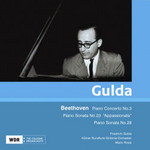
Piano Concerto No 3 / Piano Sonatas Nos 23 Appassionata & No 28
 $32.00
Out of Stock
$32.00
Out of Stock6+ weeks add to cart
BEETHOVEN
Piano Concerto No 3 / Piano Sonatas Nos 23 Appassionata & No 28
Friedrich Gulda (piano) / Kolner Rundfunk-Sinfonie-Orchester / Mario Rossi
[ Medici Arts / CD ]
Release Date: Saturday 12 April 2008
This item is currently out of stock. It may take 6 or more weeks to obtain from when you place your order as this is a specialist product.
The two piano sonatas, like the Beethoven Piano Concerto No. 3, have never been issued before and re-mastering has been done using the original WDR master tapes.
Recording:
Saal 1, Funkhaus, Cologne, 25 February 1957
Saal 2, Funkhaus, Cologne, 22 February 1957
"The recent resurgence of interest in Friedrich Gulda (1930-2000) is very welcome....Gulda's playing breathes freshness and there is delicacy to his touch that is entirely natural and which facilitates easy conversations with the woodwind soloists. Good to have this Gulda 'Appassionata'...Gulda is infinitely inquisitive, not to mention fiery. Repeated notes fizz with contained energy and when that energy erupts, it is in virtuoso waves. Gulda was 26 when these fascinating performances took place and although there are studio recordings of all three works by him, the accounts presented here are appendices that beg to he heard."
(ClassicalSource)
In the 1950s, the Austrian pianist Friedrich Gulda (1930-2000) was considered the leading interpreter of the classical masters of his generation, notably Beethoven and Mozart. In the mid 50s, he became more immersed in jazz, which rather masked his true genius playing the Viennese classics. Gulda's recordings are now beginning to enjoy cult status amongst collectors. Gulda only recorded the Beethoven Piano Concerto No. 3 once in the studio for Decca (Horst Stein) in 1970, which appears to now be deleted. The two Beethoven piano sonatas precede his Decca recordings of the same works.
The two piano sonatas, like the Beethoven Piano Concerto No. 3, have never been issued before and re-mastering has been done using the original WDR master tapes.
Jeremy Siepmann in his notes says, "One of the things that most impresses here is the sheer wholeness of the playing. Outstanding examples include all of Op. 101. Nor by any means is the Appassionata to be sniffed at, though unlike some, Gulda makes a clear distinction between passion and hysterics."
Tracks:
Piano Concerto No. 3
Piano Sonata No. 23
Piano Sonata No. 28